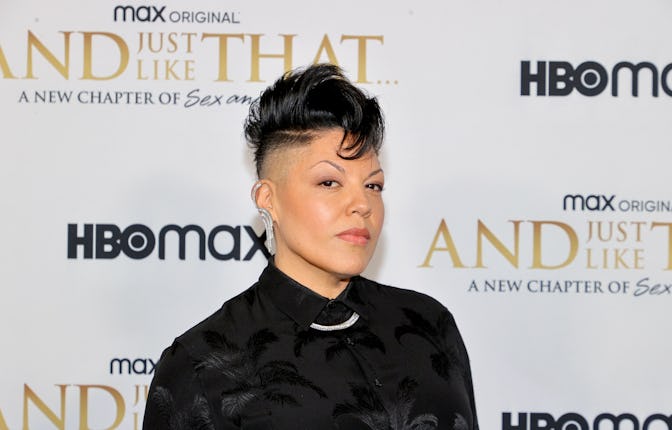Che Diaz doesn’t have to be everything to everyone
And Just Like That can't represent an entire community with one nonbinary character — nor should it.

And Just Like That is an exception from other reboots, in that it’s obsessively trying to redirect the legacy of its source material. Sex and the City is a cultural touchstone, but it’s turned into a piece of problematic nostalgia — beloved for the ripples it made, but stored away like a pair of Carrie’s vintage shoes. Over the years, SATC transmuted from a pristine piece of feminist propaganda to a relic of outdated social perspectives. By today’s standards, the legendary series had damning shortcomings surrounding race, gender, and sexuality — even if it pioneered progressive ideas around womanhood for its time. And while the original show gave its viewers permission to see themselves as sexually liberated characters, it feels like AJLT is trying to give them permission to see themselves in a more diverse world. It has attempted to have something for everyone, and feels phony as a result. One character who has garnered quite a bit of hate in that regard is Che Diaz, played by Sara Ramirez. But is Che inauthentic, or just unlikable?
If you’ve watched SATC, you’ve probably unsuccessfully tried to forget Season 3 Episode 18, titled “Cock A Doodle Do!,” where Samantha doesn’t mix well with new neighbors in NYC’s Meat Packing District. The episode tries to be cheeky by including the transgender community, but becomes horrifically offensive by using slurs like “tranny” and “chicks with dicks” while perpetuating stigmatizing attitudes about sex work. In response — because in AJLT, there is an over-the-top social correction for everything that SATC failed at — the reboot introduces Che Diaz.
Che is nonbinary, drug positive, a famous comic — and noxiously aggressive about everything that they do. Che is not a likable character. But why are they expected to be likable on a show that historically lets its characters be truly insufferable? Why do we accept Carrie’s doe-eyed backwardness, Charlotte’s profane prudishness, and Miranda’s bossy Karen-ness, but feel the need to obliterate Che for not being everything to everyone?
It’s a tough question, but the answer begins with the writing. One valid criticism around Che is that they read as a caricature of a nonbinary person, rather than a nuanced addition to the already existing tableau of neurotic New Yorkers and AJLT’s new cast. Other newcomers seem to have more profound things going on: Nya Wallace is torn about whether she wants to be a mother along with being a formative voice in social justice, Seema Patel struggles with loneliness while being scarily successful, and Lisa Todd Wexley grapples with the grossness of her immense privilege. But Che just reads like a list of their identifiers. Che is majorly concerned with policing wokeness, to the point of literally having a “woke moment” button that they use on their podcast, annoyingly titled “X, Y and Me.” And when they are not aggressively asserting the ideals of progressive social mores, they’re limited to being a projection of Miranda’s sexual fantasies and a tool for her liberation ... or used for a quick laugh while smoking blunts after giving a “comedy concert.” Che’s character suffers from a lack of interiority.
But not everyone is complex or sensitive in the real world, and Che’s lack of those things could be read as verisimilitude. Carrie is a raging narcissist who we have lovingly put up with since 1998. Che exhibits some of those same narcissistic tendencies, but they’re just more obnoxious about it. It is genuinely off-putting to watch, though. Che’s hyper-sexuality feels myopic in a show that has always been about normalizing sex, and their comedy is trite. All of their scenes make you tense your body as you brace for the cringe. It may seem odd that the writers would choose to make their first nonbinary character such a repellent — but again, everyone in SATC is a bit annoying. As Ramirez put it to the New York Times, “We have built a character who is a human being, who is imperfect, who's complex, who is not here to be liked, who's not here for anybody's approval. They're here to be themselves.”
Che’s frustrating on-screen quality doesn’t necessarily make Che a poor representation of the nonbinary community, because Che never needed to represent an entire community in the first place. The character offers one piece of nonbinary representation on-screen, and their flaws add humanness to them. I don’t look to Miranda to represent me as a cis bisexual; I look to Miranda to endlessly annoy me with her infantilizing attitude towards coming out. I’m not calling for better bisexual representation because I’m annoyed. I’m merely happy to see a grown woman on TV realizing she might have a broader sexual orientation than she originally thought, and letting that be okay. In the same way, Che being nonbinary is just a part of their character — along with being a nauseatingly famous person who likes to smoke a lot and pleasure people in kitchens. Che is allowed to contain multitudes, and that doesn’t have to be a reflection on their inclusion as a character. It all just goes to prove that legacy be damned, AJLT is just as perfectly imperfect as its predecessor.